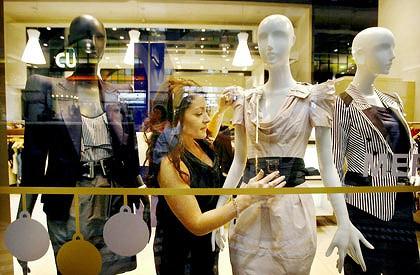A GREEN kangaroo or koala could be the symbol of a new campaign by Australia's textile, clothing and footwear industry to sell itself to ethical consumers.
It is exploring the development of an ''ethical quality'' marque to denote that a garment has been made without the use of sweatshop labour, is free of chemicals harmful to humans or the environment, and has taken animal welfare into consideration.

The idea of promoting a clean, green fashion industry is one of a number of recommendations made by a Government-backed inquiry into how Australia's $4.4 billion clothing and footwear industry can remain competitive in the face of cheap imports from India and China.
If developed, the marque would be the first of its kind in the world.
But before the body charged with developing the marque has formally embarked on the process, the thorny issue of the ethics surrounding leather, and wool from mulesed sheep, is creating an ethical conundrum.
Philip Butler the chairman of the Textile, Clothing and Footwear Industries Innovation Council, acknowledged that the issue is a complex one as each of the council's constituents - employers, manufacturers and unions - has a view.
''Take a raw material such as leather, for example, which is a byproduct. Do you ban that? If you do then you get into the debate of what replaces it.
''Should you use plastic, and if so you then have a debate over the subject of peak oil,'' he said.
He said a ''stepped approach'' starting with guidelines around labour conditions and chemicals is the most likely approach, before animal welfare is tackled. ''There are a number of complexities - not least that of mulesing [of sheep] - that need to be resolved,'' he added.
The author of the industry report that first raised the idea, Professor Roy Green, said animal welfare was a ''competitiveness issue as well as a moral one'' and that the marque must take into account the growing public concern over the mulesing of sheep. Consumers should have a choice and the ethical marque would allow Australian clothes and shoe manufacturers to command a higher price for the $1.6 billion of products the industry exports each year.
Sheep farmers say they are already phasing out mulesing and argue that customers are not as concerned about the issue as some pressure groups would have us believe.
A woolgrower and Australian Wool Innovation board member, Chick Olsson, believes Australian wool products should be included in the marque.
''I think he [Professor Green] is just being populist and trendy. I would like to know who is going to be the judge and jury of what is ethical.
''Are they saying that 50,000 woolgrowers are unethical?''
Another council member, Michele O'Neil, the national secretary of the Textile, Clothing and Footwear Union of Australia, said that whatever the criteria, the accreditation had to be rigorous.
''Anything [that] is exposed as a marketing ploy would be very damaging for the industry.''





